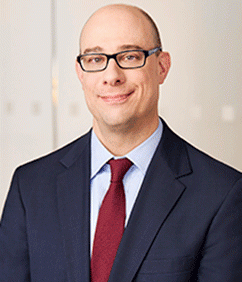Peter Furci ’95, LLM ’99 takes the helm at Debevoise & Plimpton
Twenty-seven years as a tax attorney at Debevoise & Plimpton, says Peter Furci ’95, LLM ’99, have honed his inherent love for problem-solving. An expert in private equity and M&A as well as co-chair of the firm’s global tax department, Furci has handled his share of challenging matters for private equity clients such as Carlyle; Blackstone; and Clayton, Dubilier & Rice and for corporate clients like Verizon Communications. On July 1, 2022, Furci will take on his latest challenge, becoming the firm’s presiding partner.
In this Q&A, Furci discusses why he loves tax law, what has surprised him about his career, and how a legal education from NYU Law helped give him an edge.
How did you first become interested in the law?
I didn’t really have any lawyers in my family, but I loved history. Many of the historical figures that I read about, like Alexander Hamilton in particular, were trained in the law. It seemed to me like a pretty noble, intellectual pursuit. I grew up in Brooklyn, but went to [Dartmouth College], where I became a history major because I loved critical thinking and research and writing… I was attracted to the intellectual aspects of law, but I also had some work experience in the corporate field prior to law school and thought I would ultimately be a corporate lawyer.
NYU was my first choice for a whole bunch of reasons. I found the environment at NYU to just be incredibly conducive to what I was looking for. It was this very collaborative environment. I didn’t go to law school knowing I wanted to pursue tax—that was an interest that arose while I was in law school—but obviously NYU is the best tax law school in the country. So that was just a tremendous bit of luck.
I decided to return to NYU Law for my LLM [after several years at Debevoise] because tax law is such a knowledge-driven practice. The baseline of understanding that you need of the law is so high, even at the most junior levels. I felt that it was a credential that would just be very, very beneficial to me as I started my career as a tax lawyer.
What do you like about tax law?
For me, it’s like a whole universe or set of constructs to set up problems and solve them. It’s like an alternate universe. It has its own rules and governing principles, [and] every time you think you master them, you discover there’s another uncharted part of the universe. Then, periodically, Congress actually goes and changes the governing principles of this alternate universe. So you’re constantly learning. You’re constantly on your toes. It’s really one of the most intellectually challenging fields you could possibly dream of, because it’s never static. You are always a student.
I’ve been a tax attorney for 27 years. I’m still learning new things every single day. I don’t feel like there’s a lot of fields of law where you could say that.
What has been surprising about your career thus far?
One of the things that did attract me to Debevoise, way back when, was [that] I was very interested in cross-border work, international transactions. The firm had a very meaningful international presence at the time, as it does today, with several offices in Europe and in Asia. I was very fortunate as a young lawyer to work on Asia-focused transactions, to work on Latin America-focused transactions, to work on European transactions, African transactions, and understand the different legal systems in those countries. I was able to build expertise in Latin America, and my practice now covers a few different areas.
I’ve also had the opportunity to come back and teach at NYU Law [a course on advanced partnership in tax]. I was impacted by professors as a student, and it’s been incredibly rewarding experience to connect with young lawyers-to-be. It also enables me to give them a very practical orientation towards the types of problems that they’ll be facing when they start their practice.
Has there been a case or deal that you’ve worked on that you would consider a particularly significant victory?
For me, it’s less about the single big case or single transaction structure that I point to, although there’s certainly been a number of very notable deals. For me, my sense of satisfaction really comes from the small pleasures of creating a personal relationship with clients and making a difference in what they’re doing on a daily basis, the small pleasures of being able to explain a concept to a colleague or to a client that they’re struggling with because they don’t really understand tax, and to demystify it for them in a way that enables them to make a decision and understand it. Those sorts of little micro-victories, day in and day out, are probably, for me, the most satisfying.
What are you excited about in your new position at Debevoise?
I would say I’m probably most excited about reconnecting the community we have at Debevoise after two and a half years of a very challenging pandemic period, and reaffirming what it means to be at a place that values collegiality and excellence and intellectual pursuit. I look forward to getting people back together to celebrate those values. It’s really an academic pursuit: We all learn from each other. We all teach each other.
This interview has been edited and condensed.
Posted June 27, 2022.


